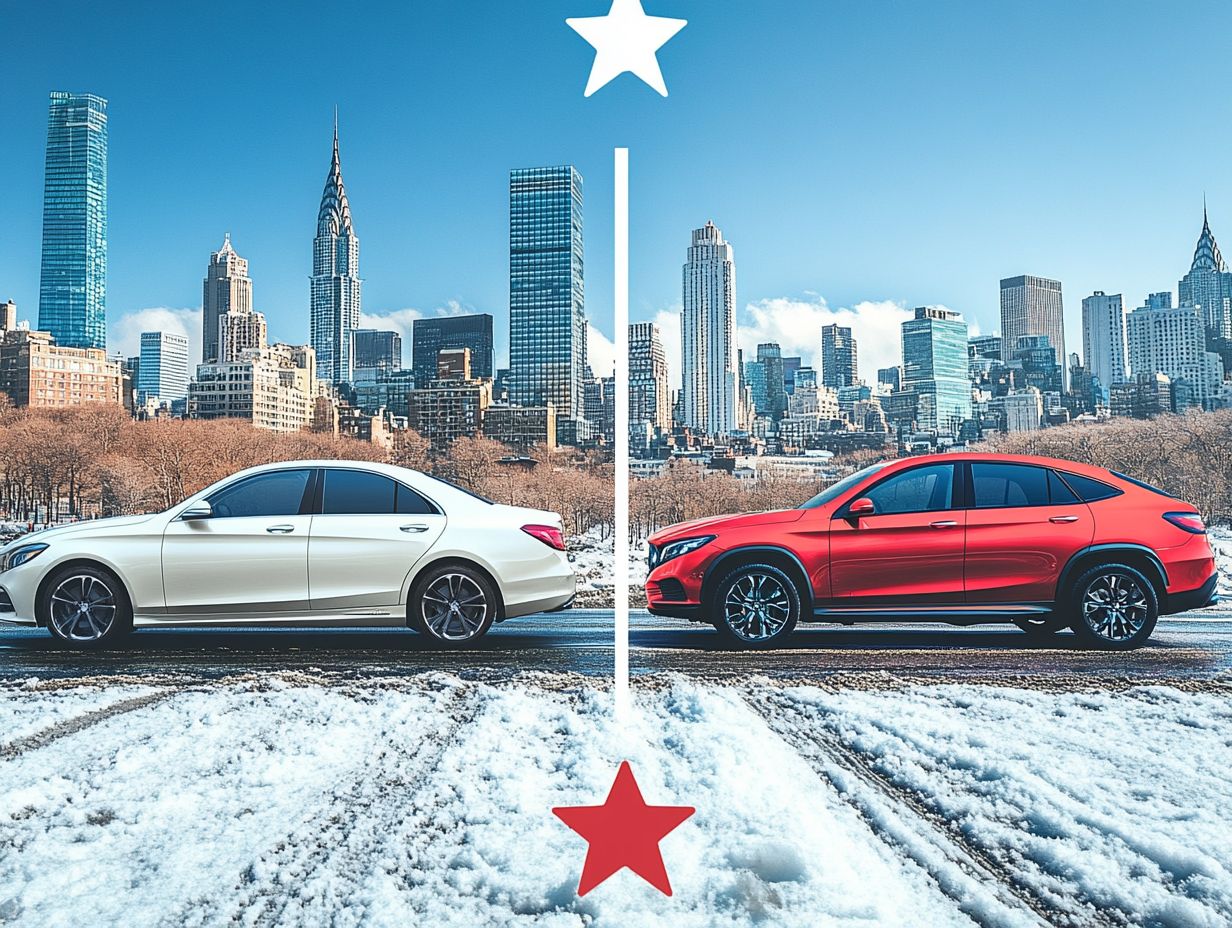Comparing User Ratings: Sedans vs. SUVs
Are you torn between a sedan and an SUV? You re not alone! Choosing between these two popular vehicle types can be a daunting task, especially with many factors to consider.
Let s dive into what makes each vehicle type unique. This guide examines the key differences between sedans and SUVs, focusing on user ratings, comfort levels, fuel efficiency, and safety features.
Whether your focus is on space, performance, or resale value, this guide will walk you through each critical point, empowering you to make an informed decision. Don t miss out on discovering which vehicle aligns seamlessly with your lifestyle!
Contents
- Key Takeaways:
- 1. Sedans vs. SUVs: What Are the Differences?
- 2. User Ratings for Sedans
- 3. User Ratings for SUVs
- 4. Comfort and Space
- 5. Fuel Efficiency
- 6. Handling and Performance
- 7. Safety Features
- 8. Cost of Ownership
- 9. Maintenance and Repairs
- 10. Resale Value
- 11. Environmental Impact
- 12. Availability of Features
- 13. Brand Reputation
- 14. User Satisfaction
- 15. Which One Is Right for You?
- Frequently Asked Questions
- What are the main differences between sedans and SUVs?
- How do user ratings compare between sedans and SUVs?
- Which type of vehicle generally receives higher user ratings?
- What factors should be considered when comparing ratings for sedans and SUVs?
- Are there any notable similarities in ratings for sedans and SUVs?
- How can one decide between purchasing a sedan or an SUV based on ratings?
Key Takeaways:

- Sedans and SUVs have distinct differences in terms of size, functionality, and performance.
- Sedans are rated highly for their fuel efficiency, making them a practical choice for those on a budget.
- SUVs typically receive higher ratings for their spaciousness and comfort, making them a popular choice for families and outdoor enthusiasts.
Consider these takeaways as you explore your options!
1. Sedans vs. SUVs: What Are the Differences?
The automotive landscape is currently shaped by lively competition between sedans and SUVs. Each brings unique advantages that cater to your specific preferences whether it s fuel efficiency, driving comfort, spacious interiors, or versatile cargo capacity.
Sedans, known for their sleek designs and performance features, offer excellent handling and fuel economy, making them ideal for urban environments. On the other hand, SUVs—be it midsize, compact, or full-size—provide ample passenger space and cargo room, appealing to families and adventure-seekers alike. For those considering a luxury vehicle, checking user ratings on luxury cars can provide valuable insights.
For instance, the 2024 Mazda CX-90 shines in the SUV category with top-notch crash test ratings from NHTSA and IIHS, giving you peace of mind when transporting your loved ones.
SUVs are making a compelling argument in the current market as consumer preferences shift toward crossovers and hybrids. These models merge the perks of both categories. Thanks to advancements in hybrid design, many SUV models now offer a delightful balance of power and efficiency, attracting eco-conscious drivers who refuse to compromise on performance.
This ongoing transition not only shapes brand strategies but also reflects broader lifestyle trends and a growing environmental awareness among potential buyers like you.
2. User Ratings for Sedans
User ratings for sedans reveal strong preferences for elements like fuel economy, comfort, and overall performance. For a deeper insight into these trends, check out understanding car comparisons, which reflect the priorities of modern drivers who value efficiency and reliability.
On various online platforms, you ll find drivers frequently praising models that deliver impressive fuel efficiency. Some even report annual savings of hundreds at the pump! Features like spacious interiors and advanced tech integrations also enhance comfort, making the driving experience much more enjoyable.
Performance metrics, such as acceleration and handling, are crucial to your satisfaction as well. Competitive pricing can influence your decision-making; you often weigh the cost against the features offered, which plays a significant role in your choice.
In this landscape, models that successfully balance affordability with superior features tend to shine in user reviews, resonating beautifully with budget-conscious car enthusiasts like yourself.
3. User Ratings for SUVs
User ratings for SUVs highlight key aspects like passenger capacity, cargo space, and safety features, showcasing their allure for families and adventure-seekers alike. For a deeper understanding, you can explore the feature comparison: sedan vs. SUV.
As consumer demand shifts towards versatile vehicles, many SUV models now flaunt impressive towing capacities that often outshine those of sedans. This capability gives you the power to transport recreational equipment think boats or trailers making SUVs a favored choice for outdoor enthusiasts.
Safety features are another critical consideration. Advanced technologies like adaptive cruise control and lane-keeping assist features that help maintain speed and keep you in your lane are becoming increasingly standard, positioning these vehicles as secure options for family-minded drivers.
While sedans may win in the fuel efficiency and smooth ride departments, the multifunctional nature of SUVs often tips the scale for those needing extra space and versatility. For insights on popular options, check out the top 10 most rated SUVs by real users.
4. Comfort and Space
When you’re considering vehicles, comfort and space take center stage. Sedans excel at providing a cozy driving experience, while SUVs prioritize generous legroom and headroom for passengers, and ample cargo space.
This distinction illustrates why sedans are a favored choice for individuals or couples who appreciate a sleek design and quieter rides. They often feature high-quality interior materials that create a luxurious atmosphere. Conversely, SUVs cater to families or adventurous souls seeking versatile seating arrangements that can accommodate more passengers or gear, and understanding the safety ratings of popular SUVs is essential for making informed decisions.
As you compare specific models, you’ll notice that some sedans provide impressive legroom for both front and rear passengers ideal for those longer journeys. Meanwhile, many SUVs boast substantial cargo space and flexible seating configurations, making them incredibly practical for a variety of lifestyles and activities.
5. Fuel Efficiency

Fuel efficiency is a vital consideration when you’re deciding between sedans and SUVs. Generally, sedans tend to excel in fuel economy, but modern SUVs are stepping up their game by incorporating hybrid technology to boost performance.
This evolution appeals to eco-conscious drivers and showcases remarkable advancements in engine technology that enhance power without sacrificing efficiency. Many manufacturers are now integrating advanced driver assistance systems, which help promote smoother driving habits and minimize unnecessary fuel consumption.
This progress leads to improvements in overall performance, allowing you to enjoy a seamless blend of speed and sustainability. When you explore the options available, it becomes evident that hybrid vehicles present an enticing choice for those who seek versatility while aiming for a reduced carbon footprint benefiting both your budget and the environment.
6. Handling and Performance
Handling and performance are pivotal when it comes to choosing a vehicle. If you re navigating urban streets, sedans often offer superior drivability and responsiveness. On the other hand, if versatility and off-roading capabilities are on your radar, SUVs might be the better fit for you.
This distinction arises from their differing weight distributions and dimensions. Sedans usually enjoy a lower center of gravity, which translates to sharper cornering and enhanced stability during quick maneuvers. In contrast, SUVs sit higher, which can result in a more noticeable body roll when you tackle tight turns.
When you assess performance metrics like acceleration and braking, sedans typically take the lead. Their lighter frames allow for quicker starts and shorter stopping distances, making them particularly attractive for city dwellers who value agility and ease of handling in crowded environments.
7. Safety Features
Safety features are crucial when selecting a vehicle, whether you’re considering a sedan or an SUV. Both types offer advanced driver assistance systems that help reduce risks, such as rollover accidents, while enhancing overall safety ratings from respected organizations like NHTSA and IIHS.
Key safety features that enhance your protection include:
- lane-keeping assist
- adaptive cruise control
- automatic emergency braking
All of these contribute to a higher safety rating and provide you with much-needed peace of mind. Many top-rated vehicles showcase impressive crash test results, ensuring superior protection should an accident occur.
As you become more safety-conscious, the effectiveness of these systems could make all the difference in your purchasing decisions, often steering you toward options that boast robust safety credentials and cutting-edge technologies designed to prevent accidents before they happen.
8. Cost of Ownership
Understanding the cost of ownership is crucial when weighing sedans against SUVs. Factors like price, maintenance, repairs, and resale value significantly affect your long-term financial commitments.
When considering your options, the initial purchase price is a major factor. Sedans usually come at a lower upfront cost, making them appealing for budget-conscious buyers.
SUVs might carry a heftier price tag, but they offer greater durability and versatility across various driving conditions. Maintenance costs may vary; sedans often require less frequent servicing and may have lower parts costs.
However, keep in mind that SUVs often hold their value better due to their popularity and demand, which can positively influence your projected resale value. By evaluating these financial aspects, you can make informed choices that align with your lifestyle and financial aspirations.
9. Maintenance and Repairs
Maintenance and repairs greatly affect the overall cost of ownership for both sedans and SUVs. Differences in service requirements and parts availability often shape your choices.
Regular upkeep tasks like oil changes, tire rotations, and brake pad replacements can vary significantly between the two types of vehicles. Sedans, being lighter and more fuel-efficient, typically demand fewer resources for routine maintenance, costing around $100 for basic services. In contrast, SUVs, with their larger engines and more intricate systems, often see maintenance costs rise to $150 or more.
The frequency of servicing can also differ. Many SUVs may need attention more often due to increased wear on their components. Brand reputation is also a key consideration. Vehicles known for their reliability tend to have fewer maintenance issues, making them attractive options for budget-conscious buyers.
10. Resale Value

Resale value plays a pivotal role in the overall cost of ownership. Certain sedans and SUVs hold their value better due to brand reputation and market demand.
Well-established brands known for reliability and innovation tend to command higher resale values compared to newer entrants or those with less favorable reputations. External market factors like economic conditions, gas prices, and consumer preferences for fuel efficiency versus luxury can significantly influence resale value trends.
As you observe the market, you ll notice that consumers increasingly lean towards SUVs for their spaciousness and utility. This shift may lead to a decline in the desirability of sedans, ultimately affecting their resale worth. Staying attuned to these dynamics is essential for anyone considering buying or selling a vehicle.
11. Environmental Impact
The environmental impact of vehicles is increasingly important as you weigh the fuel efficiency of sedans against SUVs. Exploring hybrid and electric options can help you reduce your carbon footprint.
Your choice between traditional gasoline-powered cars and their eco-friendly counterparts reflects a broader shift toward sustainability that resonates across demographics. Many individuals now consider the environmental implications of emissions, making informed decisions that align with their values.
This journey often leads you to discover the advantages of hybrids and electric models. These options not only reduce pollutants but also offer impressive fuel efficiency. As these innovative vehicles gain traction, they reshape perceptions sedans and SUVs are increasingly evaluated by their ecological footprint, paving the way for a greener future.
Evaluate your options today to find the perfect vehicle that matches your lifestyle and values!
12. Availability of Features
The features available in sedans and SUVs are crucial when you’re making a buying decision. Advanced driver assistance systems and comfort amenities are increasingly becoming standard across many models, and you ll want to pay attention to these details.
As you evaluate your options, consider leaning towards vehicles that offer a harmonious blend of technology and safety features tailored to your lifestyle. Sedans are often celebrated for their sporty handling and fuel efficiency. Many come equipped with cutting-edge infotainment systems that seamlessly support smartphone integration.
On the other hand, SUVs generally excel in spaciousness and family-focused safety tech, like lane-keeping assist and adaptive cruise control. Everyone has different preferences, and that’s okay! Perhaps you prioritize luxurious seating and high-quality sound systems in a sedan, while others might crave the rugged versatility and off-road prowess that a well-appointed SUV has to offer.
Whatever your choice, it’s essential to find a vehicle that aligns perfectly with your needs and desires.
13. Brand Reputation
Brand reputation plays a pivotal role in your decision-making process when choosing between sedans and SUVs. Established auto manufacturers often hold a competitive advantage due to their perceived reliability and customer satisfaction.
This reputation isn t built overnight; it s cultivated over years through a steadfast commitment to product quality, innovative technology, and exceptional customer service. For example, companies like Honda and Toyota have firmly established themselves as leaders in the sedan market, primarily because they consistently deliver reliable vehicles.
Brands like Ford and Subaru have carved out impressive niches in the SUV segment, providing models that are not only robust and stylish but also feature advanced safety technologies. As you weigh your options, you ll want to choose brands that embody both value and dependability.
14. User Satisfaction
User satisfaction stands as a critical benchmark for evaluating sedans and SUVs, where performance and comfort significantly influence your overall happiness. For a deeper understanding, check out the feature comparison of SUVs vs. crossovers.
Both vehicle types attract considerable attention through user surveys that assess not only their performance under various conditions but also the comfort they provide to you and your passengers throughout your journeys.
Along with these factors, reliability plays a vital role in guiding your choices, especially when considering repeat purchases. You ll want to gravitate toward brands that consistently deliver on these fronts, nurturing a sense of trust and loyalty that can endure for years.
This ongoing satisfaction shapes not just your personal decisions but also broader market trends, as more consumers seek vehicles that excel in performance, comfort, and dependability.
15. Which One Is Right for You?

Choosing between a sedan and an SUV can feel like navigating a maze, as each vehicle type brings its own set of advantages tailored to different preferences in comfort, space, and fuel efficiency. For those considering an SUV, price comparisons for SUVs for city driving can help make an informed decision.
As you weigh your options, take a moment to reflect on your lifestyle, family size, and travel habits. If you value the ability to zip around urban streets with ease, a sedan might capture your interest, especially for solo commutes or small families.
On the other hand, if family road trips with multiple passengers and diverse cargo needs are your preference, an SUV could be your best bet, offering ample storage space and a commanding view of the road.
Don t overlook your budget it plays a pivotal role in this decision-making process. Sedans typically come with lower price tags and maintenance costs, making them an appealing choice for many.
By evaluating these factors thoughtfully, you ll be well on your way to making a decision that suits your needs perfectly.
Frequently Asked Questions
What are the main differences between sedans and SUVs?
Sedans are smaller vehicles, typically with two or four doors and a separate trunk. SUVs are larger, offering more seating and a spacious cargo area.
They also have higher ground clearance and are designed for off-road capabilities.
How do user ratings compare between sedans and SUVs?
User ratings can vary greatly based on personal preferences and needs.
Some people prefer the sleek design and fuel efficiency of a sedan, while others value the versatility and ruggedness of an SUV.
Which type of vehicle generally receives higher user ratings?
This can vary, but sedans often receive higher user ratings for their smooth handling, comfortable ride, and better fuel efficiency.
On the other hand, SUVs may receive lower ratings due to their larger size, lower gas mileage, and higher price point, which can be explored further in the top user ratings for 2023 luxury SUVs.
What factors should be considered when comparing ratings for sedans and SUVs?
When comparing ratings for these two types of vehicles, consider:
- Fuel efficiency
- Handling
- Space and storage
- Price
- Safety features
Are there any notable similarities in ratings for sedans and SUVs?
Both sedans and SUVs can receive high ratings for their advanced technology features.
This includes in-car entertainment systems, safety technology, and driver-assist features.
How can one decide between purchasing a sedan or an SUV based on ratings?
The decision should reflect your personal needs and preferences.
Don t miss out on researching and comparing ratings for specific models and features that are important to you.
It’s also valuable to test drive both types to experience their performance and handling.
Start your journey today by checking out user reviews on your favorite models!






